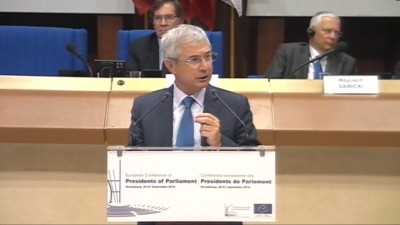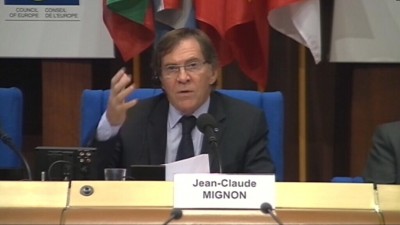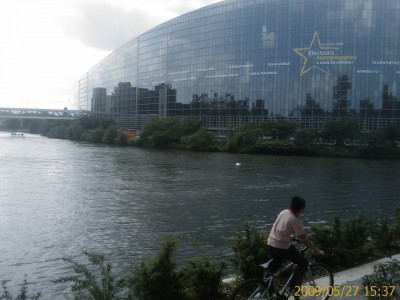 newsitems
newsitems  French Assembly President Bartolone to EuroFora: Human Rights Values important for Europe's Future
French Assembly President Bartolone to EuroFora: Human Rights Values important for Europe's Future
French Assembly President Bartolone to EuroFora: Human Rights Values important for Europe's Future

*Strasbourg/CoE/Angelo Marcopolo/- Citizens' basic Freedoms and Human Rights' respect is of fundamental importance for the Future of Europe stressed in reply to an "EuroFora" question the new President of France's National Assembly, Claude Bartolone, after crucial PanEuropean debates at the CoE.
The new French Assembly's President reacted immediately positively to an "EuroFora"s question on the potential importance of basic Human Rights' respect as a means to overcome the recent "Crisis" of representative Parliamentary Democracy also by developing Parliament's potentially effective role in helping to ensure the effective implementation of ECHR's judgements in real practice :
- "Certainly : Europe cannot speak to Citizens only through Economic issues", Bartolone replied from the start.
- Simply because, already from the start, "Europe wasn't build only on the idea of allowing a free movement of Merchandises", as he observed, speaking at the CoE, near the ECHR.
+ Indeed,"there are also (Political) Values of Freedom and Democracy, which were at the origins of the European construction", the French Assembly's President reminded.
- "And they should find anew all their importance, also today and in the Future", he stressed in conclusion.
- Because "this Europe of Values, is of Fundamental importance", as President Bartolone pointed out earlier.

=> - "The Europe of the 21st Century must be the Europe of Human Rights and of Citizens' Freedom", he optimistically stressed with voluntarism, speaking at the conclusion of CoE's 2012 Bi-Annual Summit of Parliament's Presidents in Strasbourg.
------------------
He was welcomed earlied by his compatriot and friend, CoE Assembly's President Jean-Claude Mignon, who anounced also that, after these days' debates in Strasbourg on the above mentioned issues, the PanEuropean Summit of Parliaments' Presidents intends to work, during the next 2 years also in order to find innovative ways to let Citizens have a chance to express their views, not only each 5 years, just in Elections, but also everyy time that important decisions are going to be taken by Public Auhorities :

- For that purpose, Parliaments should use any efficient and adequate, "Innovative" measure, f.ex. the Internet, Social Media and Forums, etc., be it through Referenda, Citizens' Initiatives, etc., and/or otherwise, the experienced President of CoE's PanEuropean Assembly suggested in conclusion, resuming several such ideas expressed by various National Parliament Presidents these 2 last Days in Strasbourg.
(.../...)
***
(NDLR : "DraftNews", as already sent earlier to "EuroFora"s Subscribers/Donors. A more accurate, full Final Version may be published asap).
***
Main Menu
Home Press Deontology/Ethics 2009 Innovation Year EU endorses EuroFora's idea Multi-Lingual FORUM Subscribers/Donors FAQs Advanced search EuroFora supports Seabird newsitems In Brief European Headquarters' MAPs CoE Journalists Protection PlatformBRIEF NEWS
- 00:00 - 02.06.2021
- 00:00 - 18.10.2020
- 00:00 - 19.06.2020
- 00:00 - 18.05.2020
- 00:00 - 20.04.2020
- 00:00 - 02.02.2020
- 00:00 - 09.12.2019
- 00:00 - 27.11.2019
- 00:00 - 16.11.2019
Popular
- Yes, we could have prevented Ferguson riots says World Democracy Forum's Young American NGO to ERFRA
- Spanish People Elect CenterRIGHT Majority with 1st Party and Total of 178 MPs (6 More than the Left)
- Pflimlin's vision
- The European Athletic "Dream Team", after Barcelona 2010 Sport Championship Results
- Source Conseil d'Europe à ERFRA: Debatre Liberté d'Opposants à Loi livrant Mariage+Enfants à Homos ?
- Head of BioEthics InterGroup, MEP Peter Liese : "Embryonic stem cell research reaching its END" !?
- Spain: Jailed Turkish Terror suspect with Explosive,Drones,Chechen accomplices stirs Merah+ Burgas ?
- UN Head Ban Ki Moon at CoE World Democracy Forum : - "Listen to the People !"
Latest News
- Test Photos (f.ex.+ Invit to EU + Korea Peace meeting)
- EUOmbudsmen Conference 2022: Digital Gaps affect People's Trust threaten EF Project on EU Future ?
- French Election : Black Out on Virus, but Obligation for Fake 'Vaccines" Challenged
- Both French Presidential Candidates point at "Humanism" in crucial times...
- France : Zemmour = Outsider may become Game Changer in Presidential + Parliamentary Elections 2022
Statistics
Posetioci: 60306139Archive
Login Form
Other Menu

(Opinion).
In Democracy, the forthcoming choices for EU's Top Jobs, as the New EU Parliament's President, new EU Commission's President (+ probably EU Council's President, EU Foreign Minister, etc) should be made according to EU Citizens' Votes in June 7, 2009 European Elections, and main EU Governments' strategic policies.
At the heart of the biggest EU Countries, in France and Germany, EU Citizens clearly voted for a renovated, non-technocratic but Political Europe based on Values, declared explicitly incompatible with Turkey's controversial EU bid.
This main choice was also supported in several other small or medium EU Countries, such as Austria (cf. promise of a Referendum), Spain (cf. EPP program's reservations vis a vis Enlargment), etc., while EPP Parties won also in Poland, Hungary, Cyprus, etc.
In other Countries, whenever Governing coalitions didn't make these choices or eluded them, continuing to let a Turkish lobby push for its entry into the EU, they paid a high price, and risked to damage Europe, by obliging EU Citizens to massively vote for euro-Sceptics whenever they were the only ones to offer a possibility to promise real change and oppose Turkey's demand to enter into the EU :
It's for this obvious reason that British UKIP (IndDem) succeeded now (after many statements against Turkey's EU bid) to become Great Britain's 2nd Party, unexpectedly growing bigger even than the Governing Labour Party, as well as the Liberal party ! Facts prove that it's not an isolated phenomenon : A similar development occured in the Netherlands, where Geert Wilders "Party for Freedom" (PVV) became also the 2nd biggest in the country, (after EPP), boosting the chances of a politician who had withdrawn in 2004 from an older party "because he didn't agree with their position on Turkey". And in several other EU Member Countries, even previously small parties which now focused on a struggle against Turkey's controversial demand to enter in the EU, won much more or even doubled the number of their MEPs (fex. Bulgaria, Hungary, Greece, etc).
On the contrary, whenever Socialist and oher parties were explicitly or implicitly for Turkey's controversial EU bid, they obviously lost Citizens' votes and fell down to an unprecedented low.
In consequence, EU Citizens clearly revealed their main political choices, in one way or another : They voted to change for less Bureaucracy, but more Politics and Values in a Europe really open to EU Citizens, but without Turkey's controversial EU bid.
Recent political developments are obviously different from the old political landscape which existed in the Past of 1999-2004, when Socialists based on Turkish 1% vote governed undisputed not only in Germany, but also in the UK, Greece and elsewhere, France followed old policies decided when it had been divided by "cohabitation", before the 3 "NO" to EU Referenda since May 2005, before Merkel, before Sarkozy, etc.... before the surprises of 7 June 2009 new EU Elections.
If the current candidates to the Top EU jobs promise and guarantee to respect People's democratic choices, OK.
Otherwise, Europe must find new candidates, really motivated and able to implement these democratic choices of the People.
The beginning of crucial, final Decisions are scheduled for the 1st EU Parliament's plenary session in Strasbourg, in the middle of July, and they could be completed towards the October session, when Lisbon Treaty's fate will have been fixed.
See relevant Facts also at : http://www.eurofora.net/newsflashes/news/2009electionsandturkey.html
http://www.eurofora.net/newsflashes/news/daulelections.html
http://www.eurofora.net/brief/brief/euroelectionresult.html
***


















